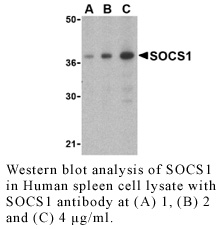Anti-Human Suppressor of Cytokine Signaling 1 (NT) (SOCS1)
Data
- -
- -
Antibody DetailsProduct DetailsReactive Species Human Host Species Rabbit Immunogen PN:S534 Product Concentration 0.5 mg/ml Formulation This polyclonal antibody is formulated in phosphate buffered saline (PBS) pH 7.4 containing 0.02% sodium azide as a preservative. Storage and Handling This polyclonal antibody is stable for at least one week when stored at 2-8°C. For long term storage, aliquot in working volumes without diluting and store at –20°C in a manual defrost freezer. Avoid Repeated Freeze Thaw Cycles. Country of Origin USA Shipping Next Day Ambient RRIDAB_2831772 Each investigator should determine their own optimal working dilution for specific applications. See directions on lot specific datasheets, as information may periodically change. DescriptionDescriptionSpecificity Rabbit Anti-Human Suppressor of Cytokine Signaling 1 (SOCS1) recognizes an epitope near the N-terminus of Human SOCS1. This polyclonal antibody was purified using affinity chromatography. Background The Suppressor of cytokine signaling (SOCS) and cytokine-inducible SH2 proteins are a family of intracellular proteins which regulate the immune cell responses to cytokines.1 SOCS1 acts to suppress dendritic cell (DC) as well as T cell hyperactivation following cytokine signaling by inhibiting JAK tyrosine kinase, a kinase necessary for type I and II cytokine receptors to initiate signaling, by directly binding to the catalytic domain of the kinase.2 SOCS1 also possesses E3 ubiquitin protein ligase activity that results in the polyubiquitination of its target proteins and subsequent degradation by the proteosome.3 It is through this method that SOCS1 negatively regulates signaling by Toll-like receptors TLR2 and TLR4 by mediating the degradation of the TLR signaling adaptor protein TIRAP.4 PubMed References & Citations1. Rakesh, K. et al. (2005) Biochem. Pharm. 70:649 2. O’Shea, JJ. et al. (2002) Cell 109:S121 3. Kile, BT. et al. (2002) Trends Biochem. Sci. 27:235 4. Mansell, A. et al. (2006) Nat. Immunol. 7:148 Technical ProtocolsCertificate of Analysis |
Related Products
- -
- -



